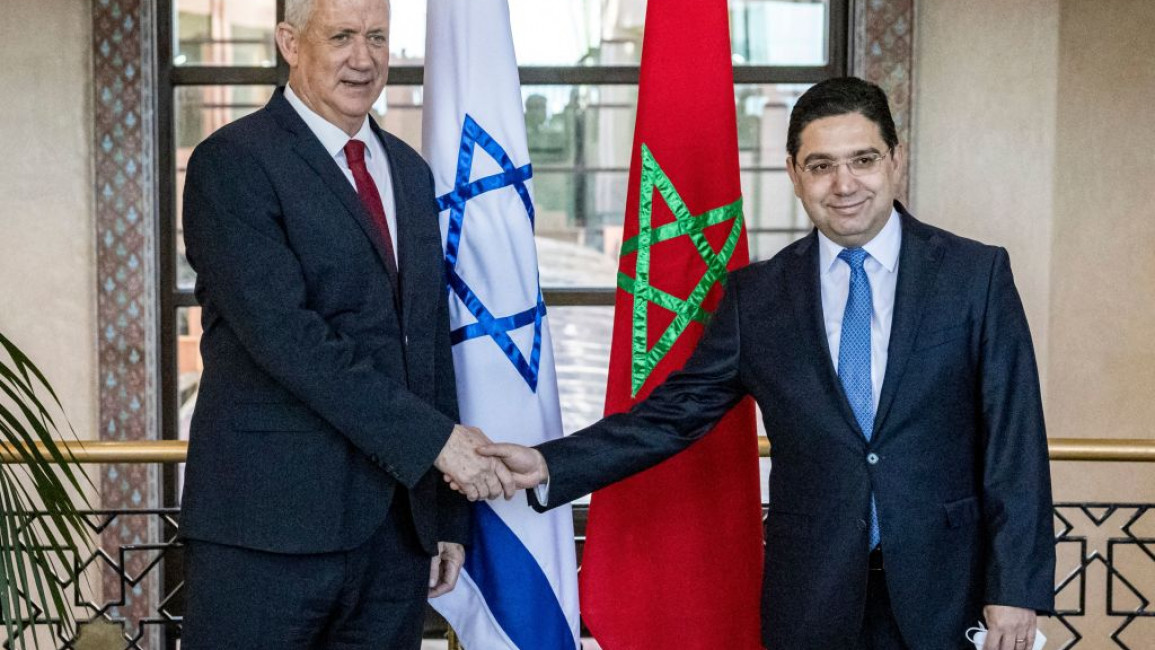Israel begins construction work of new embassy in Morocco's capital
Israel has launched construction work of its new embassy in Rabat, as both countries vow stronger cooperation after two years of normalisation.
"It is a historic moment, and we are very happy to be here today, and God willing within one year we will have a home of our own! It will not only be an embassy, but a home for all Israelis in Morocco," Alona Fisher-Kamm, Tel Aviv envoy to Rabat, said in French in a video posted on the embassy's Twitter account last week.
Over one year, the embassy will be constructed in the Souissi neighbourhood in Rabat, on land that belongs to the Israeli state and housed the premises of the former Israeli liaison office until it closed in 2000.
Under the reign of late King Hassan II, Rabat normalised ties with Tel Aviv following the Oslo peace agreement in 1993. However, in 2000, Mohammed VI, at the time the new-appointed king, cut off relations with Israel amid the second uprising (Intifada).
Since the rupture of relations between Rabat and Tel Aviv, the former building has been abandoned.
"إنها لحظة تاريخية ونحن جد فرحين لوجودنا هنا اليوم وفي وانشاء الله خلال سنة واحدة سيكون لدينا منزل خاص بنا!لن تكون سفارة فحسب،بل بيتا لجميع الإسرائيليين في المغرب" كلمات السفيرة ألونا فيشر كام أثناء وضع حجر أساس مبنى السفارة الجديدة بالرباط!إننا جد فخورين بهذه الخطوة المهمة 🇲🇦🇮🇱 pic.twitter.com/tcgoHce0ok
— Bureau de Liaison d'Israël au Maroc (@IsraelinRabat) February 22, 2023
Israel has reportedly signed a 14 million shekels (around US$4 million) contract with Moroccan architects and companies to construct new premises for the Israeli delegation.
Late in 2020, Morocco and Israel reestablished ties under the US auspices in exchange for the US recognition of Rabat's sovereignty over the disputed territory of Western Sahara.
Eight months later, Israel inaugurated its temporary liaison office in Rabat and appointed David Gorion as its representative in the North African Kingdom.
Last August, David Govrin was recalled to Israel after accusations of sexual harassment and mismanagement of his duties.
Tel Aviv said they opened an investigation into the allegations against Govrin. Meanwhile, Rabat did not comment on the scandal.
According to local media, Alona Fischer Kamm, the new head of the Israeli liaison office in Rabat, arrived in Morocco last September and started working as the new official envoy of Tel Aviv to Rabat.
The official Twitter account of the Israeli liaison office presented Kamm as the "ambassador" of Israel to Morocco.
However, Moroccan law insists that foreign ambassadors must submit their credentials to the Moroccan king or the foreign minister in a public ceremony. Kamm was not among the diplomats who met the Moroccan foreign minister Nasser Bourita last November during the most recent ceremony.
Contacted by the TNA for clarification, Rabat's foreign ministry refused to comment on Kamm's official title.
Meanwhile, the Moroccan embassy inauguration in Tel Aviv has been at a standstill for two years, as Moroccan officials are reportedly demanding Israel's formal recognition of Rabat's sovereignty over Western Sahara before moving on with the embassy project.
So far, Israel has decided not to engage on the issue, according to Israeli officials' statements to the US website Axios.
Meanwhile, the US senate decided in October 2021 that "none of the funds […] may be used to support the construction or operation in the Western Sahara of a United States consulate."
Trump administration promised Rabat a US embassy in Dakhla, a city situated in the disputed territory.
In January 2021, US ambassador David T. Fischer travelled to Dakhla to launch the official process for opening a US consulate. However, the project was suspended after the senate's decision.
For decades, Morocco has been involved in a dispute with the Algeria-backed Polisario Front, a breakaway movement that seeks to establish an independent state in Western Sahara.
The United Nations does not recognise sovereignty over the disputed territory. However, it supports Morocco's autonomy plan, which is supposed to allow Sahrawis to run their affairs "democratically" through legislative, executive and judicial bodies as Morocco retains control over the defence and foreign relations.
However, Polisario Front and Algeria have rejected Rabat's proposal.
Over the last few years, Morocco made Western Sahara the centre of its diplomatic strategy with the Moroccan king considering states' positions on the territory as a "measure" of their friendship with Rabat.



